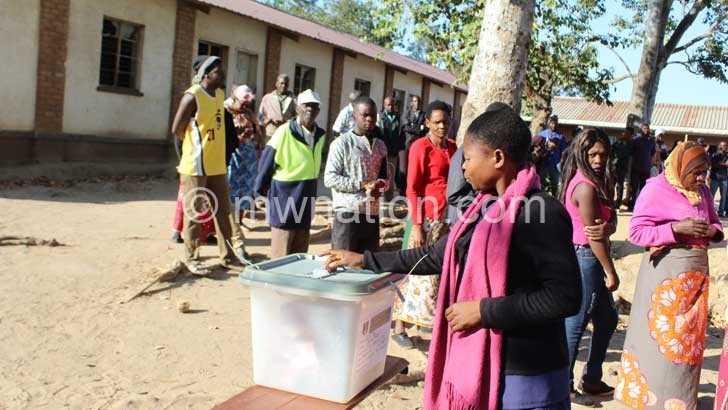A new book published by National Initiative for Civic Education (Nice) brings the nullified presidential election of 2019 back under a microscope. The authors contradict former president Peter Mutharika’s outburst that the annulment of his narrow re-election was tantamount to “a judicial coup”. They say the judges were within their mandate. What purpose does the book, Democracy Tested, serve three years on? Our Lilongwe Assistant Bureau Chief SUZGO CHITETE spoke to Nice executive director Grey Kalindekafe
A voter casts her ballot in a previous election
How different is this book from what you have produced before?
Democracy Tested is much more exciting and insightful than the previous book because its context was so unique in that it led to the nullification of a whole presidential election. It is worth noting that four of the six elections that Malawi has held so far have been contested in the courts and this is mentioned in our previous books. The nullification of the presidential election by the Constitutional Court on February 3 was not only a monumental judicial leap into the future of electoral justice, but also a renewal of Malawi’s commitment to the rule of law. This kind of commitment was unprecedented in this country and it received global attention. I guess this is what makes this book uniquely exciting.
As it were just after the 2019 polls, some of the topics in the book question the role of election observers and an analysis on the nullification of the 2019 presidential polls. How does this conversation help?
Elections are a complex undertaking and require a lot of input from a wide spectrum of players and actors through the leadership and guidance of the electoral commission. The commission is guided by the Constitution and electoral laws; hence, the conversation on the role of election observers remains crucial because many Malawians are interested to know what roles each actor played and how their performance or non-performance contributed to the result that we had.
This dialogue helps to fine-tune the roles and how these should be executed. The chapter is basically questioning whether their role adds value to our elections and also the transparency and accountability on the part of the observers as well as other players.
Anyone playing roles in our elections should be held to account and this was also echoed by the Malawi Electoral Commission chairperson Chifundo Kachale on the day that the book was launched.
Interestingly, one chapter seems to respond to a popular question: Was election nullification a judicial coup d’etat? Who do you want to benefit from this information?
This chapter basically wishes to ignite critical debate on the matter because it was echoed by one of the presidential contestants. The matter is a response to what was a strongly-held belief and opinion by that particular contestant as well as many others, most notably his followers, who are bona fide citizens. Hence, this information is meant to benefit the country and its citizenry in its quest to shape the country’s democracy and its processes.
One of the speakers at the launch Dr Zeleza Manda said he wished this book was translated into local languages. Would you make such an attempt?
Nice is a grassroots organisation and wishes to be seen to be talking to and making sense to the local Malawian out there. As such, our wish is to provide the information in this publication to citizens because we know that this would result in a healthy debate on the country’s democratic trajectory. Democracy is also largely about citizen participation. As such, if they don’t access the content of the book, they will not make any satisfactory contribution to the democratic debate. There are, of course, a lot of implications, mainly on financial resources. If we had the resources, translations would be given utmost priority.
Nice has produced a number of informative books such as Wasted Years. How do you ensure that such information reaches out to a wider population?
Under the current strategic plan for 2021-2026 Nice Trust intends to grow and have a robust research, documentation and information dissemination unit as well as mechanisms. Our view as an institution is to ensure that we make use of our current gains in terms of literature useful to Malawians; hence, our belief is that we shall be combing through all the literature that we have produced and come up with priorities with regard to what could benefit our citizens. Some of the material will have to be simplified or abridged and that requires a lot of expertise and corresponding resources.
The next general election is scheduled for 2025. Based on insights from the book, what should be done differently to improve the conduct and credibility of these elections?
The book’s authors make several recommendations in their respective chapters ,but they also raise issues for debate among Malawians. Basically, it is about ensuring that the electoral reform issues are examined and tackled objectively in time for the elections. Secondly, there should be robust information sharing and education on the country’s electoral laws among all players and actors in the country’s elections to avoid a repeat of the misunderstandings that ensued in the aftermath of the 2019 tripartite elections.
The post Democracy tested appeared first on The Nation Online.
 Moni Malawi
Moni Malawi 
